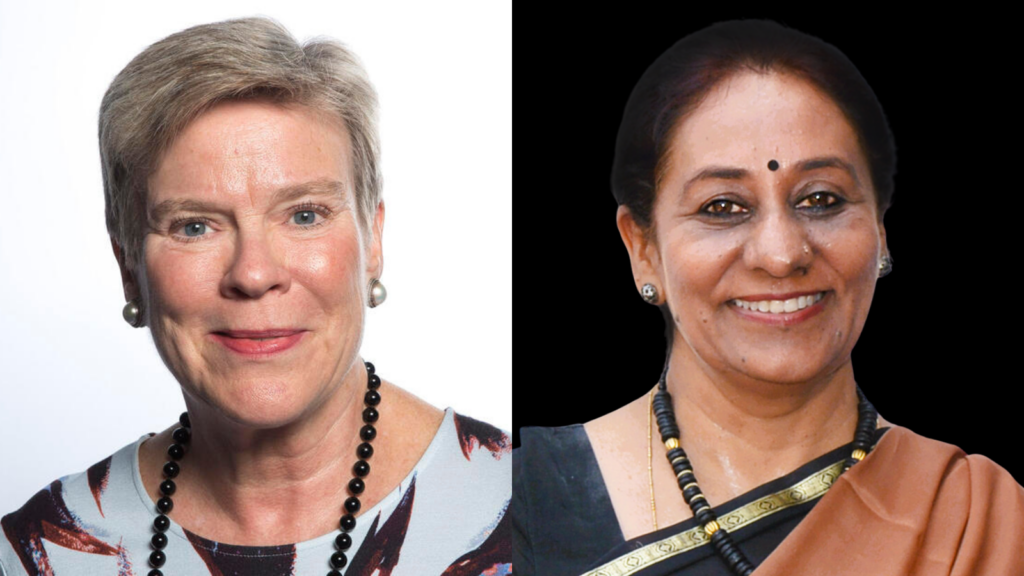The Bulletin welcomes top nuclear security experts to its leadership
By Sarah Starkey | July 5, 2024
 Rose Gottemoeller (left) is the former Deputy Secretary General of NATO, and Manpreet Sethi (right) is a distinguished fellow at the Centre for Air Power Studies.
Rose Gottemoeller (left) is the former Deputy Secretary General of NATO, and Manpreet Sethi (right) is a distinguished fellow at the Centre for Air Power Studies.
The Bulletin welcomes Rose Gottemoeller and Manpreet Sethi to its leadership.
Gottemoeller, the Former Deputy Secretary General of NATO, will join the Bulletin’s Board of Sponsors. Members of the Board of Sponsors are recruited by their peers from the world’s most accomplished science and security leaders to reinforce the importance of the Bulletin’s activities and publications.
Sethi, a Distinguished Fellow and head of the program on nuclear issues at the Centre for Air Power Studies, will join the Science and Security Board (SASB). The SASB is comprised of globally recognized leaders with a specific focus on nuclear risk, climate change, and disruptive technologies. The SASB is the main entity responsible for setting the Doomsday Clock and serves as the Bulletin’s editorial advisory board.
“Both of these leaders have spent significant portions of their lives working to reduce nuclear threats,” said Bulletin President and CEO Rachel Bronson. “It is an honor and a privilege to have their dedicated support.”
Gottemoeller is the William J. Perry Lecturer at the Freeman-Spogli Institute of the Center for International Security and Cooperation at Stanford University and a Research Fellow at the Hoover Institution.
Before joining Stanford, Gottemoeller was the Deputy Secretary General of NATO from 2016 to 2019, where she helped drive forward NATO’s adaptation to new security challenges in Europe and the fight against terrorism.
Before NATO, she served for nearly five years as the Under Secretary for Arms Control and International Security at the US State Department, advising the Secretary of State on arms control, nonproliferation, and political-military affairs.
While Assistant Secretary of State for Arms Control, Verification, and Compliance in 2009 and 2010, she was the chief US negotiator of the New Strategic Arms Reduction Treaty (New START) with the Russian Federation. A frequent contributor to the Bulletin of the Atomic Scientists, she co-authored a Bulletin article in 2023 that focused on how the legal aspects of Russia’s suspension of the New START treaty provided opportunities for US policymakers.
She is also the author of Negotiating the New START Treaty (Cambria Press, 2021), and winner of the American Academy of Diplomacy’s Douglas Dillon Book Award for a Book of Distinction on the Practice of American Diplomacy.
“Rose holds an undeniable authority in national security matters that will greatly benefit the Bulletin,” said Siegfried Hecker, the chair of the Bulletin’s Board of Sponsors. “It is a pleasure to welcome her, and we’re grateful to be able to rely on her expertise.”
Sethi is a Senior Research Advisor at the Asia Pacific Leadership Network. Since receiving her doctorate in 1997, she has worked on nuclear energy, strategy, missile defense, arms control, nuclear risk reduction, and disarmament.
Over 130 papers have been written, and nine books authored, co-authored, or edited by Sethi. She lectures at the National Defence College and other establishments of the Indian Armed Forces, Police, Foreign Services, and universities.
Sethi serves as co-chair of the Working Group on Reducing Pathways to Nuclear Use at Harvard University’s Belfer Center, and she is co-chair of Women in Nuclear–India. She is a board member of the Missile Dialogue Initiative, IISS and the recipient of the K Subrahmanyam Award (2014), Commendation by Chief of Air Staff (2020), and Commendation by Commander-in-Chief, Strategic Forces Command (2022). She is a member of the International Group of Eminent Persons selected by Japan’s Prime Minister to explore possibilities of nuclear elimination.
“Manpreet possesses a profound understanding of the nuclear threats we face, as well as a powerful passion for reducing them,” said Daniel Holz, the chair of the SASB. “Her expertise and analytical approach will further strengthen the Science and Security Board’s collective authority on existential threats.”
Together, we make the world safer.
The Bulletin elevates expert voices above the noise. But as an independent nonprofit organization, our operations depend on the support of readers like you. Help us continue to deliver quality journalism that holds leaders accountable. Your support of our work at any level is important. In return, we promise our coverage will be understandable, influential, vigilant, solution-oriented, and fair-minded. Together we can make a difference.
Topics: What’s New at the Bulletin















